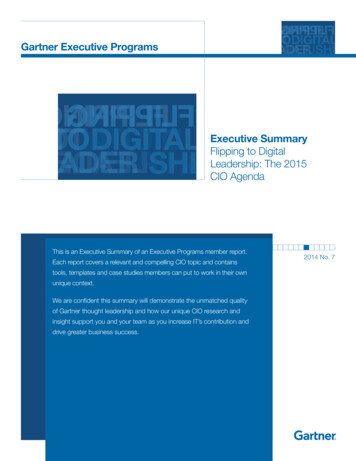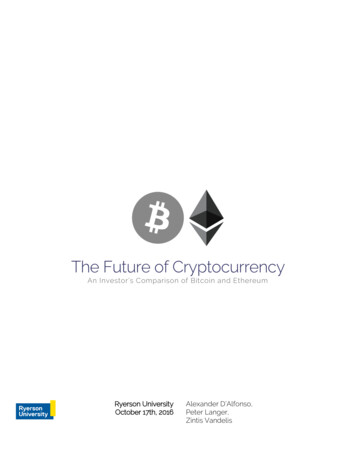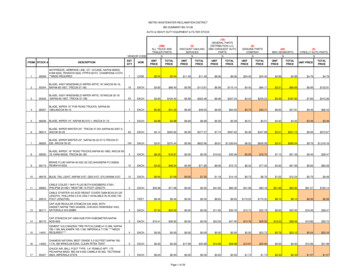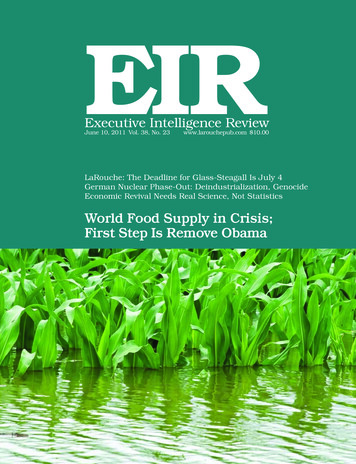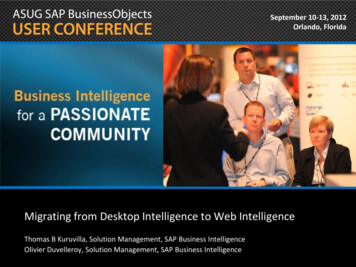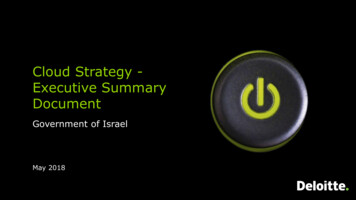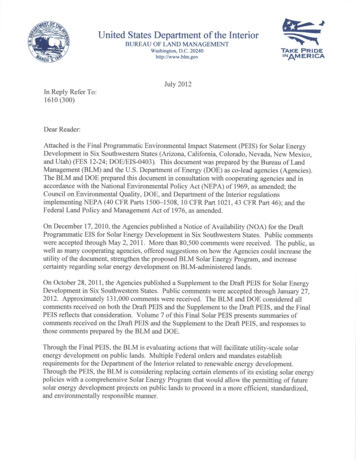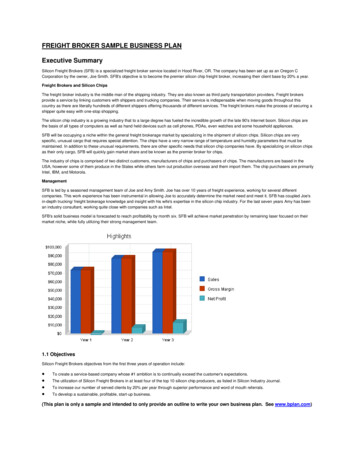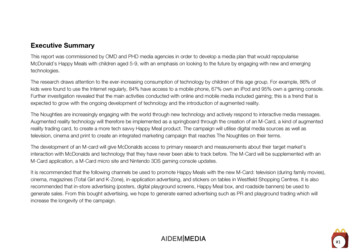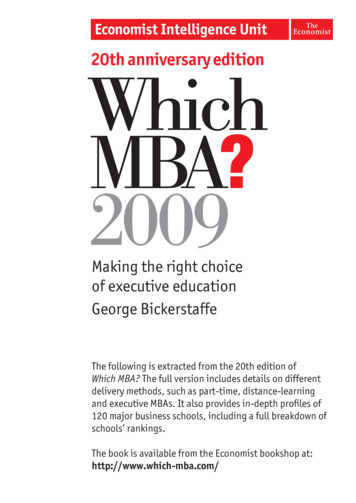
Transcription
20th anniversary editionMaking the right choiceof executive educationGeorge BickerstaffeThe following is extracted from the 20th edition ofWhich MBA? The full version includes details on differentdelivery methods, such as part-time, distance-learningand executive MBAs. It also provides in-depth profiles of120 major business schools, including a full breakdown ofschools’ rankings.The book is available from the Economist bookshop at:http://www.which-mba.com/
Have you got what it takes to be a world-class leader?90 exceptional people experience the IMD MBA each year.Launch yourself into the challenge of this intensive, one-year leadership development program:a life-changing experience.Are you: Bright, successful, on the fast track, wanting to make it to the top? A young, experienced international manager with a globalmindset and a burning ambition to lead? Ready to think outside the box and driven by the desire to make a difference?If so, IMD is the place for you.Visit us at: www.imd.ch/mbatel: 41 21 618 02 98 fax: 41 21 618 06 15e-mail: mbainfo@imd.chIMD – International Institute for Management DevelopmentChemin de Bellerive 23, PO Box 915, CH-1001 Lausanne, Switzerland
The Economist Intelligence UnitThe Economist Intelligence Unit is a specialist publisher serving companies establishing and managingoperations across national borders. For over 60 years it has been a source of information on businessdevelopments, economic and political trends, government regulations and corporate practice worldwide.The EIU delivers its information in four ways: through our digital portfolio, where our latest analysis is updateddaily; through printed subscription products ranging from newsletters to annual reference works; throughresearch reports; and by organising conferences and roundtables. The firm is a member of The Economist Group.LondonThe Economist Intelligence Unit26 Red Lion SquareLondonSW1R 4HQUnited KingdomNew YorkThe Economist Intelligence UnitThe Economist Building111 West 57th StreetNew YorkNY 10019, USHong KongThe Economist Intelligence Unit6001, Central Plaza18 Harbour RoadWanchaiHong KongTel: (44.20) 7576 8000Fax: (44.20) 7576 8476E-mail: london@eiu.comTel: (1.212) 554 0600Fax: (1.212) 586 1181/2E-mail: newyork@eiu.comTel: (852) 2585 3888Fax: (852) 2802 7638E-mail: hongkong@eiu.comWebsite: http://www.eiu.comElectronic deliveryThis publication can be viewed by subscribing online at http://store.eiu.comCopyright 2008 The Economist Intelligence Unit Limited. All rights reserved. Neither this publication nor any part ofit may be reproduced, stored in a retrieval system, or transmitted in any form or by any means, electronic,mechanical, photocopying, recording or otherwise, without the prior permission of the Economist IntelligenceUnit Limited.ISBN-13: 978-0-86218-209-0British Library Cataloguing in Publication Data.A catalogue of this publication is available from the British Library.The authors of EIU Research Reports are drawn from a wide range of professional and academic disciplines. All theinformation in the reports is verified to the best of the authors’ and the publisher’s ability, but neither can acceptresponsibility for loss arising from decisions based on these reports. Where opinion is expressed, it is that of theauthors, which does not necessarily coincide with the editorial views of the Economist Intelligence Unit Limitedor of The Economist Newspaper Limited.10 9 8 7 6 5 4 3 2 111 10 09 08 07Printed and bound in Great Britain by Halstan & Co Ltd., Amersham, Buckinghamshire.
ContentsThe MBA: riding out a storm9What you’ll learn—core and elective subjects17What you’ll learn—soft skills23Full-time rankings28TheBathMBA%R EHZERGIH QEREKIQIRX TVSKVEQQI HIWMKRIH XS GLEPPIRKI XLI [E] ]SY XLMRO EFSYX XSHE]«W GSQTPI\ FYWMRIWW IRZMVSRQIRX 'SRWMWXIRXP] VEROIH EQSRK XLI PIEHMRK KPSFEP 1&% TVSKVEQQIW ERH HIPMZIVIH F] SRI SJ XLI 9/«W XST FYWMRIWW WGLSSPW 8LI &EXL 1&% MW HIWMKRIH JSV QEXYVI ERH I\TIVMIRGIH GERHMHEXIW WIIOMRK E TVSKVEQQI XLEX IQTLEWMWI WIPJ E[EVIRIWW MRXYMXMSR GVSWW GYPXYVEP WIRWMXMZMX] ERH IRXVITVIRIYVWLMT WOMPPW EW [IPP EW E WSGMEPP] VIWTSRWMFPI ERH IXLMGEP ETTVSEGL XS FYWMRIWW ERH QEREKIQIRX %GGVIHMXIH JSV SZIV ]IEVW [MXL E VITYXEXMSR JSV I\GIPPIRGI ERH ZEPYI JSV QSRI] *YPP ERH TEVX XMQI WXYH] STXMSRW EZEMPEFPI 8 ) QFE FEXL EG YO[[[ FEXLQFE GSQ
Do your MBA where theworld does businessInvest in an MBA at Cass, and you’ll be putting your money where theworld’s business elite put theirs.From our home in the City of London, we give our MBA students the best overview of the currentthinking and practice of the world’s leading global businesses that make the City their home. It’sthe most thrilling, total immersion ‘field trip’ designed to equip you for the real world. Whether youchoose a 12 month full-time MBA or two year part-time Executive MBA, you will gain both thetheory and practical skills to do business at the very highest level.Find out more at a Cass MBA information session in London or meet us at a city near you.Call us on 44 (0)20 7040 8608, visit www.cassmba.com or e-mail cass-mba@city.ac.ukwww.cassmba.com
AcknowledgementsWe would like to thank all the business schools that filled in our lengthy questionnaire andencouraged their students and graduates to complete the separate questionnaire designedfor them. Thanks, too, to those schools that made available for interviews their faculty,administrators and students during our editorial visits or took the time to visit the EconomistIntelligence Unit offices in London. Lastly, we are grateful to all the students and graduateswho contributed valuable comments on schools and programmes.BUSINESS, ECONOMICS AND FINANCEFOR GLOBAL LEADERSHIPPIONEERS IN GLOBAL MARKETSWe teach state-of-the-art theory, immerse students in international experiences, and connectthem to best practice in business and policy.CONNECTED TO BUSINESS Many seniorexecutives visit the School each semesterthrough our CEO, Entrepreneurs, CorporateResponsibility and Real Estate forums.INTERNATIONAL TO THE COREOur students come from Europe, Asia, Africa,and Latin America, and international experiences are built into our programs in partnership with major foreign schools and companies.BOSTON: A GREAT PLACE TO LIVEAND STUDY Brandeis is in Boston, hometo eight major research universities and to250,000 students.EMPLOYMENT We have a strong record ofplacing our students in leading corporationsand public sector institutions across the globe.ADMISSION@LEMBERG.BRANDEIS.EDU WWW.BRANDEIS.EDU/GLOBAL
“Financially,they say the‘nice decade’is over”“This financialapproachworked when themarkets werefavourable”The University of Edinburgh is a charitable body,registered in Scotland, with registration number SC005336.A typical conversation on the MBA atthe University of Edinburgh BusinessSchool: people bouncing ideas off eachother. Agreeing. Disagreeing. Expandingarguments. Innovating. It’s a never-endingnetwork of stimulating discussion fromstudents from all over the world. But it’snot the only network. Edinburgh is one ofthe major financial and commercial centresin the UK. Our network of business contactsprovides you with a unique opportunity thatputs you right at the heart of business. Andwhen you talk about unique, think Edinburghthe city: named the ‘best place to live andwork in the UK’ and the second most visitedplace outside London. Host of the largest artsfestival in the world. With a strong career andpersonal development programme, the chanceto develop the skills to communicate your ideas,an Edinburgh MBA is like no other. It provides anunrivalled network you can tap into – a networkfrom where your career can really take off.JOIN THE NETWORKby visiting www.business-school.ed.ac.uk“But thatapproach led toexposure to risksno-one reallyunderstood”“That’swhere riskmanagementbecomescrucial”The University of Edinburgh Business School holdsboth EQUIS and Association of MBAs accreditation.
Extracted from the 20th edition of Which MBA?The MBA: riding out a stormIn the 20 years since Which MBA? was launched the MBA degree has seen many ups and downs,many booms followed by inevitable busts. Through it all the MBA has proved itself remarkablyresilient, capable of adaptation and reinvention, matching its structure and the skills it teaches to the demands of the time.At the moment it is going through yet another turbulent period as the global credit crunch andrising oil prices have forced recruiters to scale back hiring plans. However, yet again this doesnot—as yet at any rate—seem to have dented enthusiasm for the MBA, among either potentialstudents or recruiters of MBA graduates.The number of GMAT tests being taken (always a good proxy of interest in taking an MBA sincealmost all business schools require it) in the first five months of 2008 rose by 11% comparedwith the same period in 2007.The MBA job marketThe job market for current MBA graduates also looks bright. In the Economist IntelligenceUnit’s 2008 survey of business schools for Which MBA?, careers offices helped place, on average, 90% of their students in jobs within three months of graduation; and over half of the students we surveyed had received more than one firm job offer.Despite rising tuition fees, the MBA still offers a more-than-reasonable return on investment.Graduates on full-time programmes can expect a basic salary increase of 83% compared withtheir pre-programme jobs. The average basic salary of a full-time graduate at the schools wesurveyed was US 93,972—a rise of almost 10% compared with last year. In Europe, where students tend to have more work experience, the average salary broke the US 100,000 mark. Evenin North America, which has seen a swathe of job cuts in the financial services sector—a keyrecruiter of MBAs—salaries were holding up well, with many schools reporting steady increaseson last year.Table 1.1Average starting salaries of recent MBA graduatesSalary, US % increase on pre-MBA salaryWorld93,97283Asia & Australasia74,86494106,7338589,13280EuropeNorth AmericaWhich MBA? The Economist Intelligence Unit Limited 20089
Extracted from the 20th edition of Which MBA?The MBA: riding out a stormTable 1.2Average starting salaries of recent graduates from selected schoolsSchoolSalary, US % increase on pre-MBA 424139Monash95,83340Curtin95,16728Hong Kong UST78,307139Queensland71,98379Asia & AustralasiaIndian Institute (Ahmedabad)59,879n/aJapan59,443179Hong Kong SB57,727102115,000111North AmericaHarvardPennsylvania (Wharton)110,55062MIT (Sloan)107,99058Dartmouth (Tuck)107,40678Columbia107,26555Northwestern (Kellogg)104,10055Chicago103,21949California at Berkeley (Haas)101,85957Virginia (Darden)100,57555New York arwick134,200109HEC Paris132,940105IMD130,00064Oxford (Saïd)130,00058Audencia (Nantes)127,50041City (Cass)127,29076UC Dublin123,28848Strathclyde120,00033EuropeNote: Guaranteed base salaries of graduates. Increase compared with pre-MBA salary. Local currencies converted using average exchange rates for 2008:US 1 A 1.2, 0.73, HK 7.80, 0.5, NZ 1.36, Rs41.35, S 1.51, 117.76.Which MBA? The Economist Intelligence Unit Limited 200810
Extracted from the 20th edition of Which MBA?The MBA: riding out a stormWhere the jobs are and where graduates want to goNot that salary is the be-all and end-all for MBA graduates. They are typically more likely toconsider things such as career or personal development than merely remuneration. Theyare also becoming more inclined to put a greater emphasis on issues such work–life balanceor a company’s ethical background. One way that this can be seen to manifest itself is in thenumber of schools that are placing students in not-for-profit organisations—80% in our mostrecent survey. Impressive though this is, as Table 1.3 shows it is still well below the more traditional recruiters, such as consulting or finance.Table 1.3Industry sectors recruiting graduates from the most recent graduating full-time MBA classSector%Consulting, professional services98.3Banking, finance96.6Technology, media, telecommunications94.1Industry, engineering, manufacturing93.3Consumer, retail91.6Pharmaceuticals, healthcare87.4Non-profit, public sector79.8Entertainment, publishing63.0Are recruiters happy hirers?The relatively benign jobs outlook for MBA and other business graduates reflects widespreademployer satisfaction with MBA recruits. Employers are said to especially value business schoolgraduates for their management knowledge and communications skills as well as the technicaland quantitative skills typical of MBA graduates.Recruiters point to experience with earlier MBA hires to back up their sense that the MBA is avaluable credential worth paying for. A survey by the Graduate Management Admission Councilfound that the majority, 83%, said they were very or extremely satisfied with employees whohave MBAs. Nearly all the employers said they strive to provide challenging and interestingassignments in an effort to retain the people they hire.Which MBA? The Economist Intelligence Unit Limited 200811
Extracted from the 20th edition of Which MBA?The MBA: riding out a stormMBA: A brief historyThough often thought of as a “modern” phenomenon and frequently associated with the heady daysof the 1980s boom and the dotcom crash of the late 1990s, the MBA is an old qualification.It first appeared in the US over 100 years ago, developing from the accounting and book-keepingcourses introduced as the country lost its frontier image and began to industrialise. It was modelledon the standard American two-year postgraduate academic programme and most students enrolledstraight after taking a first degree. This model won rapid acceptance and spread quickly.However, half a century later, MBA programmes were being attacked for a lack of academic rigourand poor relevance to business issues. Two damning reports appeared in 1959, condemningAmerican graduate management education as little more than vocational colleges filled withsecond-rate students taught by second-rate professors who did not understand their fields, did littleresearch and were out of touch with business.Business schools responded rapidly, raising both their admissions and teaching standards andestablishing the now well-known American emphasis on academic research. The overall effect wasthe creation of the classic American MBA model: a first year of required “core” courses to providea grounding in the basics of management, and a second year of electives to allow specialisation ordeeper study.At the same time, interest in management education was growing in Europe, especially in theUK, which was looking for an antidote to its economic and industrial decline. Business schools,intended as “centres of excellence” and modelled closely on American schools, particularly Harvard,were created within the universities of London and Manchester. The result was not greeted withenthusiasm. It has long been argued that the UK was wrong to copy a system that was then fairlynew and was itself a response to particularly American problems. The insistence on an academicregime meant that business schools might ignore the contribution that business itself could make.This division of opinion between academic and industry-leaning business schools continues today.Not all institutions in Europe copied the American model. IMD, INSEAD, Henley and Ashridge were allstarted by groups of companies to provide management training. In France, the local and regionalchambers of commerce played a big part in establishing and supporting business schools.The early 1990s saw a new wave of criticism of MBA programmes, this time focused on a supposedlack of relevance to modern business. The MBA was said to be too academic, too theoretical anddivorced from real-life business practice. MBA graduates were criticised for adopting an analyticaland quantitative approach to business issues when companies needed managers with more diffuseskills, such as leadership. Faculty were said to lack business experience and to be more interested inresearch than in providing business solutions.If anything, this criticism has intensified during the early years of the 21st century. It has ledschools, particularly in North America, to make further changes to the MBA programme designand curriculum, adding courses on so-called “soft skills” such as communications, leadership andinterpersonal relations.Other factors are also driving change. Recruitment of MBA graduates by management consultantsand financial services has been in decline for some years and there has been a need to develop otherjob markets. The globalisation of business has made many of the MBA programmes in the US (wherebusiness schools were busy satisfying a huge domestic demand) look increasingly parochial. USschools also face increased competition from their European counterparts, which, because of theinternational nature of European society and the closeness of most schools to industry, are alreadymeeting some of the criticisms.Which MBA? The Economist Intelligence Unit Limited 200812
Lyon, FranceEDUCATING ENTREPRENEURS FOR THE WORLDAre you an entrepreneur at heart?Here’s the right MBA for you!INTERNATIONAL MBAAccording to our participants, it is the combination of the year-long consulting project, the largediversity in student body and faculty, and the strong focus on entrepreneurship that makes our12-month International MBA programme so uniquely suited to meet their needs. If you are looking for adynamic learning experience that allows you to develop your entrepreneurial skills, it might be just theright MBA for you too!CONTACT US 33 (0)4 78 33 77 83www.em-lyon.com/theentrepreneurialmba
All this space and nowhere to hide.Set in over 150 acres of English parkland – just a half hour journey from London –Ashridge has all the space you’ll need to prepare for future leadership.Yet, for a world-class business school, we offer a surprisingly intimate learning experience.In a class of just 30 experienced professionals, you can expect high levels of personalparticipation and individual attention from your tutors.There’s nowhere to hide.The Ashridge One-year Full Time MBA starts in January.The Ashridge Two-year Executive MBA starts in September.Experience the programme for yourself at our ‘MBA in a Day’,which takes place at Ashridge six times a year.The Ashridge MBA.It’s personal.To book your place or for more informationcall: 44 (0) 1442 841483 visit: www.ashridge.org.uk/mba-which email: mba@ashridge.org.ukRegistered as Ashridge (Bonar Law) Memorial Trust. Charity number 311096.
Extracted from the 20th edition of Which MBA?What you will learn—core and elective subjectsMBA programmes generally break down into “hard” and “soft” skill sets. Chapter 3 looks at howsoft skills (such as negotiation, communication and leadership) are taught. This chapter examines the “harder” topics such as functional subjects and analytical tools.The coreIn most programmes hard topics are split into two groups: required courses, usually known asthe core, that nearly all students must take; and elective, or optional, subjects that studentscan follow because they have a particular interest or career ambitions. The core is studied earlyin the programme and electives later.However, these are changing times for the MBA, and the traditional core is under pressure.As outlined in more detail in Chapter 3, recruiters now assume that the hard subjects are welltaught and their real interest is in students’ competence in the more hard-to-define soft skills,and that the real differentiator between schools is their ability to design and deliver these. Asa result there are now almost as many soft skill subjects included in the core.In contrast, hard subjects are coming to be seen almost as a “commodity”—fairly standardisedan
choose a 12 month full-time MBA or two year part-time Executive MBA, you will gain both the theory and practical skills to do business at the very highest level. Find out more at a Cass MBA information session in London or meet us at a city near you. Call us on 44 (0)20 7040 8608, visit www.cassmba.com or e-
